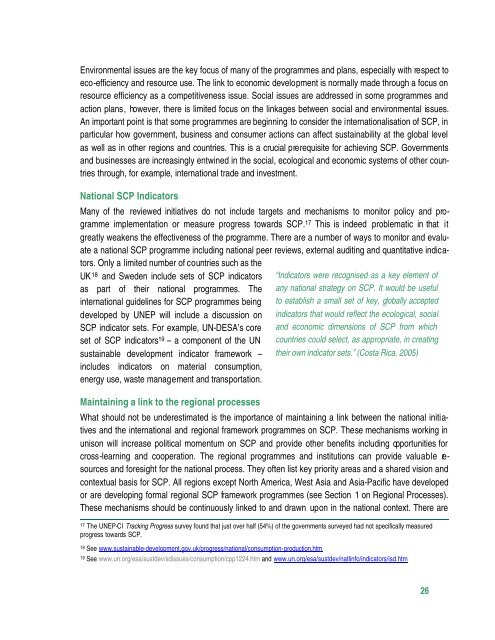National SCP Programmes and Action Plans - Development
National SCP Programmes and Action Plans - Development
National SCP Programmes and Action Plans - Development
You also want an ePaper? Increase the reach of your titles
YUMPU automatically turns print PDFs into web optimized ePapers that Google loves.
Environmental issues are the key focus of many of the programmes <strong>and</strong> plans, especially with respect to<br />
eco-efficiency <strong>and</strong> resource use. The link to economic development is normally made through a focus on<br />
resource efficiency as a competitiveness issue. Social issues are addressed in some programmes <strong>and</strong><br />
action plans, however, there is limited focus on the linkages between social <strong>and</strong> environmental issues.<br />
An important point is that some programmes are beginning to consider the internationalisation of <strong>SCP</strong>, in<br />
particular how government, business <strong>and</strong> consumer actions can affect sustainability at the global level<br />
as well as in other regions <strong>and</strong> countries. This is a crucial prerequisite for achieving <strong>SCP</strong>. Governments<br />
<strong>and</strong> businesses are increasingly entwined in the social, ecological <strong>and</strong> economic systems of other countries<br />
through, for example, international trade <strong>and</strong> investment.<br />
<strong>National</strong> <strong>SCP</strong> Indicators<br />
Many of the reviewed initiatives do not include targets <strong>and</strong> mechanisms to monitor policy <strong>and</strong> programme<br />
implementation or measure progress towards <strong>SCP</strong>. 17 This is indeed problematic in that it<br />
greatly weakens the effectiveness of the programme. There are a number of ways to monitor <strong>and</strong> evaluate<br />
a national <strong>SCP</strong> programme including national peer reviews, external auditing <strong>and</strong> quantitative indicators.<br />
Only a limited number of countries such as the<br />
UK 18 <strong>and</strong> Sweden include sets of <strong>SCP</strong> indicators<br />
as part of their national programmes. The<br />
international guidelines for <strong>SCP</strong> programmes being<br />
developed by UNEP will include a discussion on<br />
<strong>SCP</strong> indicator sets. For example, UN-DESA’s core<br />
set of <strong>SCP</strong> indicators 19 – a component of the UN<br />
sustainable development indicator framework –<br />
includes indicators on material consumption,<br />
energy use, waste management <strong>and</strong> transportation.<br />
Maintaining a link to the regional processes<br />
“Indicators were recognised as a key element of<br />
any national strategy on <strong>SCP</strong>. It would be useful<br />
to establish a small set of key, globally accepted<br />
indicators that would reflect the ecological, social<br />
<strong>and</strong> economic dimensions of <strong>SCP</strong> from which<br />
countries could select, as appropriate, in creating<br />
their own indicator sets.” (Costa Rica, 2005)<br />
What should not be underestimated is the importance of maintaining a link between the national initiatives<br />
<strong>and</strong> the international <strong>and</strong> regional framework programmes on <strong>SCP</strong>. These mechanisms working in<br />
unison will increase political momentum on <strong>SCP</strong> <strong>and</strong> provide other benefits including opportunities for<br />
cross-learning <strong>and</strong> cooperation. The regional programmes <strong>and</strong> institutions can provide valuable resources<br />
<strong>and</strong> foresight for the national process. They often list key priority areas <strong>and</strong> a shared vision <strong>and</strong><br />
contextual basis for <strong>SCP</strong>. All regions except North America, West Asia <strong>and</strong> Asia-Pacific have developed<br />
or are developing formal regional <strong>SCP</strong> framework programmes (see Section 1 on Regional Processes).<br />
These mechanisms should be continuously linked to <strong>and</strong> drawn upon in the national context. There are<br />
17 The UNEP-CI Tracking Progress survey found that just over half (54%) of the governments surveyed had not specifically measured<br />
progress towards <strong>SCP</strong>.<br />
18 See www.sustainable-development.gov.uk/progress/national/consumption-production.htm<br />
19 See www.un.org/esa/sustdev/sdissues/consumption/cpp1224.htm <strong>and</strong> www.un.org/esa/sustdev/natlinfo/indicators/isd.htm<br />
26
















